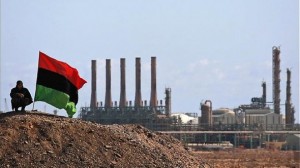Tripoli, 30 April
Libya’s largest refinery at Ras Lanuf continues to lie idle because of a standoff between the National Oil Company . . .[restrict]and the UAE investors who own it equally.
The refinery, which is capable of processing 220,000 b/d of high quality sweet Sarir crude was damaged during revolution, the principle harm being caused to the main cooling tower. However work to repair this and control equipment hit in the fighting was due to have been completed by the beginning of the year. Yet the re-start of the refinery has been postponed repeatedly, the last missed date for the resumption of operations being 30 March.

Last week, NOC chairman Nuri Berouin told the Oil and Gas Conference in Tripoli that one of the problems causing the delay was because last year Qaddafi regime officials had mixed different crudes in the tanks so they were out of specification. But the problem would be resolved soon, he said. There have been other technical reasons given over the past few months as to why the refinery is still not working.
Although no one at either NOC or the Abu Dhabi-based conglomerate, the Al-Ghurair Group, which jointly own the Libyan Emirates Oil Refining Company, Lerco, has yet commented officially, it appears that NOC wants to rewrite the terms of what it considers the uneconomic supply agreement made with the Qaddafi regime in 2009.
An oil trader closely closely associated with Libyan oil has told the authoritative Gulf States Newsletter (GSN) that NOC had been unhappy at the low fixed-price supply contracts its was obliged to accept by the Qaddafi regime. These made its investment in Lerco’s marginally profitable. “NOC are getting high prices for Sarir crude, so it is better to sell the crude on the international market than at a discount to Lerco, to produce marginally profitable products.” said the trader.
Though Libya cannot produce enough refined products to meet its domestic demand, it is able to buy in from elsewhere in the Mediterranean. However, the high level of local subsidies, not least petrol, makes domestic trade in locally refined product barely economic.
Top Al-Ghurair executive Abdelaziz Al-Ghurair, the chief executive of Mashreq Bank, upon which his father built the group’s fortunes, came to Libya in January, as part of a large UAE business delegation. He stayed on to talk to NOC about the Lerco project, whose local UAE interest is vested in a company called TRASTA Energy. He announced that it was intended to invest $1.2 billion over the next four years upgrading the refinery. This plan may not have pleased NOC. It would seem that if NOC is not prepared to contribute its half of this investment, its equity in Lerco could be diluted.
The joint venture’s position has been complicated by an official report from Qaddafi’s own regime which was deeply critical of the Lerco deal. ‘The Annual Report by the Control Board for 2010’, uncovered last December by Reuters, revealed that no official price was ever agreed for the 25 year supply agreement that NOC was obliged to sign. The final figure, the report concluded, had given Lerco “unjustified discounts”, the formula for pricing had been inappropriate and NOC lost money as a result.
The standoff today however presents political as well as financial problems for the government. The UAE was an early and strong backer of the NTC, supplying warplanes for the NATO-led air effort as well as finance and weaponry to the revolution. The Al-Ghurair Group is closely connected to Abu Dhabi’s ruling family and the billionaire Abdelaziz Al-Ghurair is also speaker of the UAE’s Federal National Council.
The government is therefore likely to want to honour its debt of gratitude but at the same time, it does not wish to see NOC losing money through Lerco’s operation of the Ras Lanuf refinery, when NOC could be exporting the Sarir and Messia feedstock far more profitably through Tobruk’s Mersa Al-Harigah terminal.
A Lerco board meeting is likely to be held in Tripoli in mid-May, where proposals to restructure the company and its supply agreements will be considered. [/restrict]






